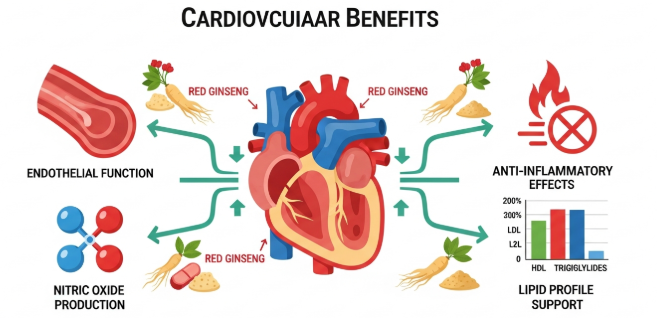How Korean Red Ginseng Supports Cardiovascular Function
Cardiovascular health is central to longevity and overall wellness. Risk factors such as high blood pressure, oxidative stress, and inflammation contribute to heart disease, atherosclerosis, and endothelial dysfunction. Korean Red Ginseng (Panax ginseng) has been studied for its potential to support vascular health, improve circulation, and maintain healthy heart function.
⚠ Disclaimer: Red ginseng may support cardiovascular health but is not a substitute for medical treatment for heart disease, hypertension, or other cardiac conditions.
1. Mechanisms of Cardiovascular Support
1.1 Endothelial Function and Nitric Oxide Production
- Ginsenosides enhance nitric oxide (NO) synthesis, promoting vasodilation
- Improved endothelial function supports healthy blood pressure and circulation
📎 Reference:
https://pubmed.ncbi.nlm.nih.gov/19884332/
1.2 Anti-Inflammatory Effects
- Chronic vascular inflammation contributes to atherosclerosis
- Red ginseng reduces pro-inflammatory cytokines such as TNF-α and IL-6
- Protects arterial walls from oxidative damage
📎 Reference:
https://pubmed.ncbi.nlm.nih.gov/25639392/
1.3 Lipid Profile and Cholesterol Support
- Clinical studies suggest red ginseng may modestly reduce LDL cholesterol and triglycerides
- May improve HDL cholesterol levels, supporting healthy lipid balance
📎 Reference:
https://pubmed.ncbi.nlm.nih.gov/19705168/
1.4 Anti-Oxidative and Cardioprotective Effects
- Red ginseng neutralizes free radicals, reducing oxidative stress on cardiac tissue
- Protects myocardial cells and improves overall cardiac resilience
📎 Reference:
https://pubmed.ncbi.nlm.nih.gov/20447414/
1.5 Adaptogenic Effects
- By moderating cortisol and stress responses, red ginseng reduces stress-induced cardiovascular strain
- Supports heart rate stability and vascular health under stress
📎 Reference:
https://pubmed.ncbi.nlm.nih.gov/21386932/
2. Clinical Evidence
| Study | Participants | Intervention | Outcome |
|---|---|---|---|
| Park et al., 2012 | Adults with mild hypertension | 3 g/day red ginseng extract | Improved endothelial function, lower blood pressure |
| Choi et al., 2006 | Healthy adults | 2 g/day | Increased nitric oxide, improved circulation |
| Kim et al., 2011 | Adults with dyslipidemia | 3 g/day | Reduced LDL cholesterol, improved HDL cholesterol |
| Lee et al., 2010 | Elderly adults | 3 g/day | Enhanced cardiac antioxidant status, improved vascular flexibility |
Note: Typical clinical dosages range 2–3 g/day of standardized extract, over 4–12 weeks.
3. Recommended Use
- Oral supplements: Standardized extracts 2–3 g/day
- Fermented forms: May enhance ginsenoside absorption for cardiovascular benefits
- Combine with balanced diet, regular exercise, and stress management for optimal heart health
Red ginseng is a supportive supplement for cardiovascular wellness — not a replacement for prescribed medications.
4. Who May Benefit
✔ Adults seeking to maintain healthy blood pressure and circulation
✔ Individuals with mild dyslipidemia
✔ People under chronic stress affecting heart health
✔ Aging adults aiming to support vascular function naturally
5. Safety and Side Effects
- Generally well tolerated
- Mild side effects: insomnia, digestive upset, mild nervousness
- Possible interactions with blood thinners, antihypertensives, or anticoagulants
- Safe duration in clinical trials: 4–12 weeks
FAQ
Q: Can red ginseng lower blood pressure naturally?
A: Clinical studies suggest it can modestly support healthy blood pressure through improved endothelial function and nitric oxide production.
Q: Is it safe for long-term cardiovascular use?
A: Generally safe for up to 12 weeks; longer-term use should be monitored by a healthcare provider.
Q: Does it help with cholesterol?
A: Red ginseng may help reduce LDL cholesterol and triglycerides while supporting HDL levels.
Q: Can it replace heart medications?
A: No — it’s a complementary approach for vascular and cardiac support.







